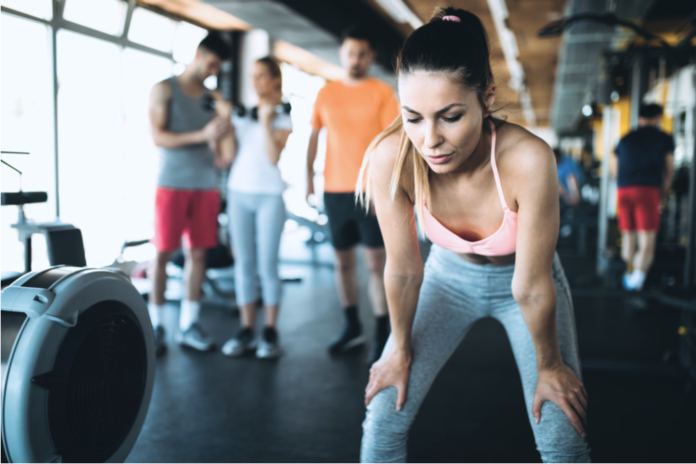The modern-day gym environment can be overwhelming and provoke anxiety for various reasons. In turn, this highly affects many people’s motivation and opportunity to improve their health with exercise. Luckily, there are a few ways to overcome gym insecurities and gym anxiety and they just require practice to succeed!
Learn all about how to get over insecurities, how to get over anxiety, and how to conquer your first day at the gym so you are eager to return.
What Is Gym Anxiety?
Anxiety is defined as a feeling of worry, nervousness, or unease, typically about an imminent event or something with an uncertain outcome, thus, gym anxiety elicits these same feelings when someone considers going to work out at the gym. Many thoughts can trigger gym anxiety and it is a fairly common struggle. Moreover, three main fears perpetuate this irrational but understandable disorder including fear of judgment from others, disappointment, and failure.
Because gym anxiety is less regarded than other kinds of anxiety, it is not always taken as seriously but it can highly affect someone’s ability to better their health. A typical gym atmosphere is intimidating enough for the average person and can legitimately impede the quality of life for a person with gym anxiety.
Common Triggers
The most common triggers of gym anxiety include:
- Feeling like you do not belong
- Not knowing how to properly use the equipment
- Being intimidated by fitter people
- Feeling like others are judging you
- Not knowing what workout to try
- Worrying about physical appearance
- Feeling embarrassed about sweating, body shape, etc.
- Having low self confidence
Thankfully, various methods can help reduce these insecurities and break free from anxious thoughts about attending the gym. The general recovery strategies fall into five categories including exposure therapy, managing negative thoughts, building confidence, seeking help, and choosing alternatives.
Positive Self-Talk
Gym anxiety stems from within and is conquered from within as well. The mind is much more powerful and malleable than people realize. However, various research shows that our thoughts highly impact our realities, so positive self-talk is an effective tool for overcoming gym anxiety.
Equally exciting is that there is no one right way to do it! Positive self-talk can look different for everyone and still evoke potent results. Generally speaking, positive self-talk involves having empathy and speaking kindly and encouragingly with yourself. Some people recall life mottos while others give themself a pep talk and still others enter a sort of meditative state to create their reality through their thoughts.
Self-talk is considered a mixture of conscious and subconscious beliefs and biases and these unconscious cognitive processes can influence feelings and behavior humans do not realize. Too often, self-talk patterns are negative and hinder someone’s ability to progress or heal. Whereas, positive self-talk can help reduce stress, boost confidence and resilience, and overcome fear and mood disorders in some cases.
Some examples of positive self-talk statements regarding the gym include:
- “I control the power to control my mind. I get to choose how to respond to this situation.”
- “I am courageous and I am so proud of myself for stepping out of my comfort zone.”
- “This is an opportunity to learn, which always betters myself.”
- “Even though I have a long road ahead, I value how much I have already progressed.”
- “The next moment is a chance to try again, to make a healthy decision.”
- “I cannot control how others perceive me, and their thoughts do not affect the way I see me.”
- “I am capable and strong and resilient and can do hard things.”
- “I am doing the best I can today and that is enough.”
- “I will not let others’ potential judgements affect my motivation to move my body in a joyful way.”
- “I am going to the gym for me and I intend to focus on only my while there.”
Gym Exposures
Also referred to as habituation, gym exposures involve repeatedly attending the gym to diminish the physiological and emotional responses to this fearful, frequently repeated stimulus. It can feel unbearable at first, but over time it tends to successfully help people overcome some of their biggest psychological fears. There are numerous ways to approach this feat:
- Attend one or two of the same, smaller group fitness classes each week.
- Pick one cardio machine and complete a workout only using one piece of equipment for the first few weeks after joining.
- Seek out a personal trainer that feels safe.
- Create a gym atmosphere and visualize yourself as if you were actually at the gym.
- Pick one exercise and complete 3-4 sets of it for the first couple days and try to increase the number of exercises by one or more every few days until you achieve a full workout.
Plan Workouts Ahead of Time
Uncertainty frequently evokes anxiety and this is no different when approaching workouts willy-nilly. Making last-minute decisions is usually more stressful than having a plan in place. Thus, planning the workout before arriving at the gym reduces decision fatigue and provides more space for positive self-talk, motivational thoughts, and mental focus.
There are numerous ways to approach workout planning.
The easiest planning method is hiring a personal trainer to guide and/or program workouts. This completely reduces decision fatigue and serves as an encouraging support system. For more independence, virtual trainers typically program individualized workouts without the in-person interaction.
Other people may plan their workouts at the beginning of each week – dividing the days as upper, lower and/or full body workouts and rest and finding ideas through social media or Pinterest or by purchasing a workout program from online health coaches and personal trainers.
Then again, some people plan their workouts day by day, using intuition to guide their exercise choices. This method usually does not fare well with people first attempting to go to the gym because anxiety can hinder intuition.
Planning workouts in macro and micro cycles is another effective way to reduce anxiety at the moment. It usually entails planning workouts week by week and for three to four months at a time. This sounds like a fun activity to try with a friend!
Focus On the Workout
Believe it or not, many people at the gym are worrying about whether they are being judged or look funny on a machine or look fast enough on the treadmill. But this is silly thought and takes away from the workout, especially in terms of mind-muscle connection. Focusing on the correct form and cadence and pace of a workout when distracted by ruminating thoughts is difficult.
Rather, concentrating only on the workout at hand is helpful. Doing this will exert better mind-muscle connection, which research shows results in improved strength, size of the muscle, and more calories burned. Plus, this focus also promotes a more efficient workout and better overall progress.
Here are a few tips and tricks to hone focus during a gym workout:
- Wear comfortable clothes that make you feel confident.
- Set intentions to focus on yourself and the workout at hand before walking into the gym.
- Choose an enjoyable workout along with equipment and machines.
- Avoid exercising in front of mirrors until you feel confident enough.
- Workout in a more secluded area of the gym.
- Record sets, reps and weight used for different exercises in a journal/notebook.
- Attend the gym outside of peak hours (6-9am and 3-7pm).
- Utilize music, a podcast or audiobook if that does not distract you further.
- Turn your phone on airplane mode or commit to not texting/socializing on it while at the gym.
- Use visualization techniques to picture yourself performing exercises.
Bring a Companion
Finally, bringing someone along to enjoy the fun of a workout can ease some anxiety. Make sure the companion is dedicated, diligent, and will not distract from the workout more. Often, bring someone with similar goals and intentions, someone who is encouraging and uplifting, and someone who will push you out of your comfort zone.
Conversely, bringing someone who just wants to chit-chat, who complains a lot, or who might be working out for the wrong reasons is less helpful. At this point, they might be deterred from the above point!
The companion need not only be a close friend, either – they can be a personal trainer, a co-worker, etc. A personal trainer is debatably the best option because they are qualified in exercise programming and execution and motivation techniques.
Additional Methods
If gym anxiety persists after trying the above methods, it might be time to seek more thorough assistance. Most importantly, do not give up until the anxiety is conquered, because it is well worth it!
- Seek professional help from a therapist or sports psychologist.
- Journal and/or meditate about the fear and take one action step every day.
- Build confidence through self talk, achieving a goal, and accepting yourself.
- Find a comfortable or specialty gym like an all-female gym or one that inspires motivation to return again.
- Consider other workout options, as intense gym anxiety could mean your body simply craves a different atmosphere to thrive while exercising.
In Summary
Gym anxiety is a fairly common struggle defined by feelings of worry, nervousness, and unease about attending the gym or similar atmosphere. It can greatly impede one’s ability to better their health through exercise and sometimes requires medical or psychological intervention to overcome.
Various tools like positive self-talk, gym exposures, planning ahead, focusing only on the workout, and bringing an exercise companion can ease gym anxiety over time. If those methods prove unsuccessful, seek further help, likely from a professional such as a therapist or sports psychologist. Everyone deserves to attend a gym in peace!
References:
Cherry K. What Does It Mean to Be Habituated to Something? Verywell Mind. Updated December 2, 2020. www.verywellmind.com/what-is-habituation-2795233.
Cuncic A. How to Cope With Social Anxiety at the Gym. Verywell Mind. Updated November 20, 2020. www.verywellmind.com/cope-with-social-anxiety-at-the-gym-4125214.
Ordway J. 11 Painless Steps to Overcome Gym Anxiety. Premier Health. Published March 8, 2016. www.premierhealth.com/your-health/articles/women-wisdom-wellness-/11-painless-steps-to-overcome-gym-anxiety.









